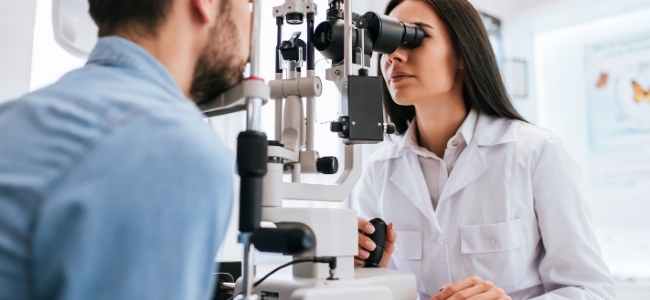Optometry is a profession in the health sector that involves examining the eyes for abnormalities, diagnosing, and providing treatment for disorders related to the visual system.
In Frankfort, general optometry services are offered in several facilities. Optometrists, who were known as ophthalmic opticians in the past, also provide vision therapy and low vision care.
What do Optometrists do?
- Conduct eye examinations
- Diagnose problems
- Evaluate vision
- Write prescriptions
- Recommend and provide treatment
- Provide pre-operational and post-operational care
- Counsel patients
Conditions Optometrists Treat
1. Retinal disorders
Retinal disorders include macular degeneration, epiretinal membrane, retinal tear, floaters, and diabetic retinopathy. They share the same symptoms like vision loss or blurred vision.
2. Myopia
It is also known as nearsightedness. It makes it difficult to focus on objects that are far away. In extreme cases, surgery may need to be performed by an ophthalmologist; if it is not extreme, contact lenses and eyeglasses can be recommended.
3. Glaucoma
This is damage to the optic nerve which connects the eye to the brain. After its diagnosis, an optometrist creates a treatment plan.
4. Cataracts
They occur when cloudy patches appear in the lens. They affect vision and can lead to blindness. Although an optometrist can prescribe glasses, if surgery is needed, an ophthalmologist will be required to perform that.
5. Color blindness
At the moment, there is no cure for color blindness. Glasses, contact lenses, and visual aids can be used to help an individual with the condition. Children are checked for color blindness in assessments, but it is an easier diagnosis in adults.
Optometrists can specialize in education, research, and sports vision, among other areas. They work in:
· Academic settings
· Research facilities
· Private practice
· Health centers
· Military
· Corporate setting
Who is an ophthalmologist? An ophthalmologist is a medical doctor that can perform surgery for eye conditions. The surgeries may include:
I. Corneal
Transplants – It is a procedure to replace the clear front layer of the eye which is known as the cornea. Healthy tissue is used to replace damaged cornea.
II. Oculoplastic
surgery – Is the reconstructive surgery of the facial tissues such as eyelids and eyebrows.
III. Glaucoma
Surgery – It involves removing the drainage tubes of the eyes to allow fluids to drain easily.
IV. Strabismus
surgery – It is meant to tighten the muscles of the eye and change the alignment of the eyes.
V. Surgery for retinal disorders – One of the surgeries involves the use of lasers to repair tears in the retina. A piece of silicone material can also be sewn to the sclera to relieve the force that is caused by tugging in surgeries for some disorders.
VI. Cataract surgery
What is the major difference between an ophthalmologist and an optometrist? The major difference is an ophthalmologist can perform surgery while an optometrist cannot.
